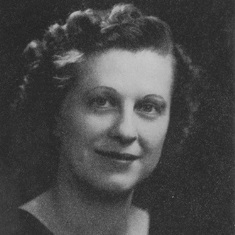Maxwell’s First Female Full-Time Professor Was an ‘Indomitable Presence’
June 17, 2024
Marguerite J. Fisher was a revered teacher known for her international scholarship and activism for domestic social issues.
Marguerite J. Fisher ’42 Ph.D. (PSc) joined the Maxwell School faculty in August 1943, as war raged across the globe.

While the war necessitated women’s entry into the workforce, roles remained limited. Fisher, the first female promoted to associate professor then full professor at Maxwell, was a trailblazer—and a fierce one at that. She traveled extensively, studied women’s rights around the world and shared unflinching assessments, including her 1962 observation that, “Russians use the brains of women more than we do in America.”
Students who were late to her class had to enter through the window.
By the time Robert McClure arrived a quarter-century later, she had become a larger-than-life figure.
“I first met her when she was a tenured grande dame of the faculty, and I was a junior nobody. I didn’t want to cross her. She was an indomitable presence,” says McClure, professor emeritus of political science and public affairs and former senior associate dean of the Maxwell School. “I grew to have great respect for her. She had a strong student following that reveled in her stories and quirkiness.
She had been everywhere, and she knew everyone.”
Fisher graduated cum laude from Smith College in 1926. She received a master’s degree from Columbia University in 1927 and a Ph.D. in political science from Maxwell in 1942.
Her academic work on international issues was extensive and sometimes controversial. In 1952, at the height of the McCarthy era, she published “Communist Doctrine and the Free World,” though colleagues urged her to delay publication. She was also outspoken in her opposition to the Vietnam War and published studies of women’s rights around the world.
“I grew to have great respect for her. She had a strong student following that reveled in her stories and quirkiness. She had been everywhere, and she knew everyone.”
Robert McClure
professor emeritus of political science and public affairs and former senior associate dean of the Maxwell School
Fisher encouraged her students to engage in civic life. For one of her graduate courses, she had students perform 12 hours of political party work or service to civic groups. She took her own advice, serving as president of the Onondaga County League of Women Voters and the Syracuse Federation of Business and Professional Women. “If women are to play more than a passive role…they must be part of the machinery which determines the candidates and the issues, namely, the two major political party organizations,” she wrote in 1947 in an article for The Annals of the American Academy of Political and Social Science.
Carol Faulkner, professor of history and senior associate dean for academic affairs, sees this intentional engagement as part of Fisher’s legacy. “When I came to the dean’s office, the first thing the dean did was give me a picture of Marguerite Fisher,” she says. “Even though, historically, it has sometimes seemed like a very male space, it is welcoming to women and welcoming to people from around the world.”
Kristi Andersen, professor emeritus of political science, also found respect at Maxwell. When she arrived for her interview in 1984,
Thomas Patterson, the political science chair at the time, had his infant child in the office while his wife worked. “He was ahead of the time, so that made me feel good about the department,” Andersen says. She regrets she never met Fisher, who had retired years earlier. “I remember hearing about her from older colleagues—male colleagues—they all thought Maggie Fisher was a good teacher, a smart person and a real character,” she says.
McClure suggests her reputation was a product of her trailblazing life. “As the first tenured female on the faculty, she had to put up with a lot. She dealt with it by taking it head on and staring it down. She was a magnificent woman,” he says.
Fisher’s memorial service in 1990 in Hendricks Chapel was as unforgettable as she was. As speakers from all over the world told stories and a group of women danced the hula in her honor, McClure thought, “She went out as she came in, one of a kind.”
By Lenore Friend
Published in the Spring 2024 issue of the Maxwell Perspective
Related News
School News

Apr 18, 2025
School News

Apr 15, 2025
School News

Apr 2, 2025
